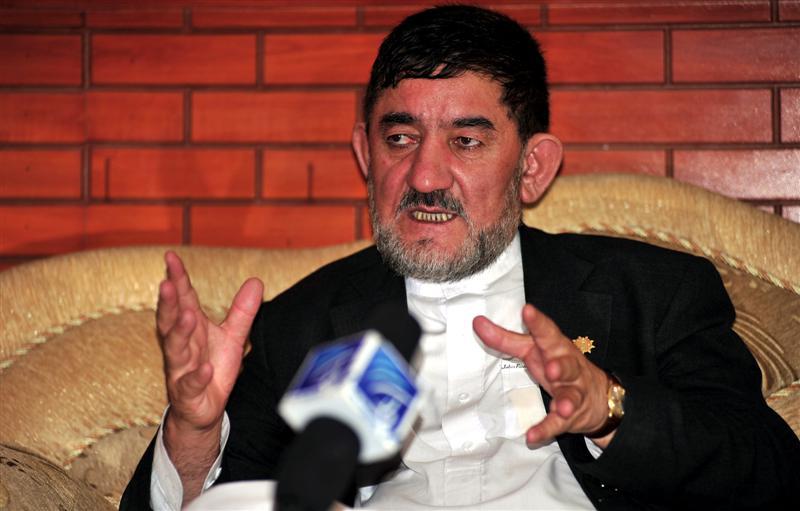KABUL against the Soviets but regretted his involvement in the civil war.
Baik was born 57 years ago in the Hazar Somach village of the district of the same name in Takhar province. He graduated from night school in Kunduz province in 2008. He participated with his party, Jamiat-e-Islami Afghanistan during the war against the Soviet Union, he said.
Baik himself was a commander of Jamiat-e-Islami, and fought against the Soviet Union and the Taliban in Takhar. “I regret the clashes among our Afghan brothers, but I was proud of the jihad,” he says now. He said that he handed over most of his weapons to Disbandment of Illegal Armed Groups (DIAG) in 2001 after the collapse of Taliban government, but kept eight weapons to protect himself. He remains a member of the Jamiat-e-Islami party.
He said he supports peace talks with militants on the condition that they accept the national constitution.
He now lives in the Khoshhal Khan Maina area of Kabul with two of his four wives, the other two of whom remain in Takhar. He has 31 sons and 37 grandsons. One of his sons, Abdul Matin Baik, serves on the provincial council in his home province and, according to Baik, helps him address his constituents’ needs.
The guest room where he hosted a Pajhwok reporter features commander Ahmed Shah Massoud and other armed groups. He says he receives some 40 constituents there each evening to discuss their problems. On Mondays, he contacts ministries and other government departments to try to solve them, he says.
Before 2008, he worked as a provincial police chief in the northern provinces of Takhar and Kunduz, he said. Before nominating himself for the 2010 parliamentary election, he had been working as deputy minister of borders and tribal affairs, he said.
He won his post in Parliament with 4,000 votes, having spent about $160,000 on his campaign. He is one of 19 members of the Saadat Parliamentary bloc, the goal of which, he says, is to promote national unity. He says the group includes members of different tribes and ethnic groups. He himself speaks fluent Uzbek and Dari, and he can also speak Pashto‘s internal security commission.
He has been accused by Takhar residents and websites of trafficking in drugs, charges he vehemently denies.One Takhar resident, who asked not to be identified for fear of reprisal from Baik, whom he considers a warlord, also said Baik was involved in the theft of land in Takhar’s capital city.
“Every commander fought in Afghanistan, and some people will be unhappy with some commanders,” Baik said. “Some people might also be unhappy with me. War means bloodshed, not distributing sweets,” he said.
Baik praised Pakistan for assisting the mujahiddeen and Afghan refugees during the war against the Soviet Union, but said Pakistan had also had a hand in the destruction that followed.
“After the collapse of Russia in Afghanistan, Afghans wanted to establish a government, but Pakistan interfered and did not let Afghans make their own government,” he said.
He also praised Iran and Tajikistan for assisting the Afghan people. Asked about allegations that Iran was assisting militants, he said such reports are only accusations.
He said foreign troops had been necessary to defeat terrorism in Afghanistan. But he said foreign troops did not work honestly in the country, because they created many disputes and caused civilian casualties. Further, he said, because Al Qaeda had been defeated in Afghanistan, the presence of foreign troops was no longer necessary.
He said he did not oppose the government but blamed President Karzai for his failure to cooperate with the legislature, saying it has shaped the country’s politics. He acknowledged that the Wolesi Jirga had had difficulty accomplishing anything substantial over the past six months, since the legislature had been mired in a dispute with the executive and the judiciary over the results of last year’s Parliamentary election.
At home, he recites half a chapter of the Quran each morning and then walks for half an hour. In the evenings he reads law and history books. He likes wrestling and horseback riding and owns four horses. He listens to music, especially the songs of Dor Mohammad Kashmi and Homahang, and watches documentary films, he said.
He has no criminal record under the current government. He was sentenced to jail for 18 months during the communist regime when he was a soldier and spoke out against the government.
myn/kg








GET IN TOUCH
NEWSLETTER
SUGGEST A STORY
PAJHWOK MOBILE APP